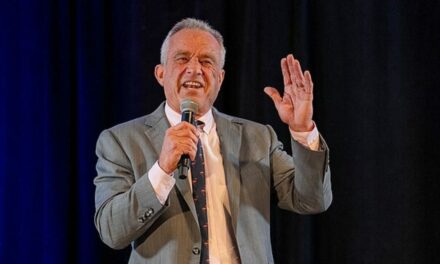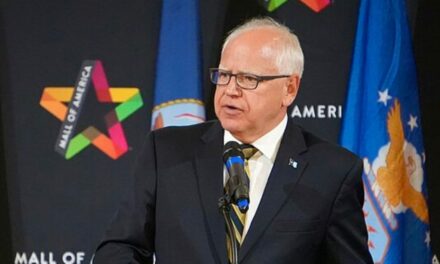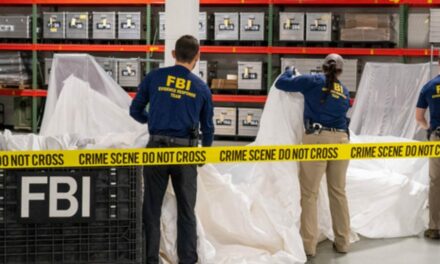We support our Publishers and Content Creators. You can view this story on their website by CLICKING HERE.
Liz Cheney, a staunch “Never Trump” former Republican representative, has joined Democratic presidential nominee Kamala Harris in key swing states in the final days of the campaign to warn voters that Donald Trump does not respect the “rule of law” or the U.S. Constitution. “[When] you think about, what are you looking for in somebody you hire, you’re looking for somebody that you can trust, you’re looking for somebody who’s going to be responsible, who’s going to operate in good faith,” Cheney told the Detroit Economic Club on Oct. 22.
But new evidence has emerged suggesting that Cheney may have unethically influenced crucial anti-Trump testimony while serving as vice chairman of the January 6 Committee that investigated the protest at the U.S. Capitol in 2021.
At issue is Cheney’s collaboration with Cassidy Hutchinson, now 27, a former aide to then-Chief of Staff Mark Meadows. Hutchinson, who also is campaigning for Harris, is widely considered the committee’s “star” witness for her damning account of Trump’s alleged conduct on January 6. For nearly two hours during her June 28, 2022, televised appearance, Hutchinson explained her version of what happened before and after Trump’s speech at the Ellipse as the White House scrambled to respond to the escalating chaos at the Capitol.
RELATED: Biden Desperately Tries To Clean Up After Ruining Kamala’s Big Night With ‘Garbage’ Insult
In one of the more explosive moments of that hearing, Cheney held up the handwritten draft of a tweet for President Donald Trump to post instructing protestors to disperse from the area.
Cheney asked Hutchison if she had written the tweet, which was never posted. “That’s my handwriting,” replied Hutchinson, who said the words had been dictated to her by Meadows that afternoon around 3:00 p.m. A footnote in the committee’s final report stated that a “review of Hutchinson’s handwriting was consistent with the script of the note.”
The import of the testimony was clear: Hutchinson was not only an eyewitness but a key participant as events unfolded that day.
But a certified handwriting analyst retained by Rep. Barry Loudermilk (R-Ga), chairman of the House Administration Subcommittee on Oversight, determined that Hutchinson did not write the note. The handwriting, according to the expert, belongs to Eric Herschmann, a Trump White House lawyer who had immediately contradicted Hutchinson’s testimony in 2022 and later provided several samples of his own handwriting to Loudermilk’s analyst.
“The Select Committee was willing to take [Hutchinson] at her word, rather than checking into the facts. The American people deserve the truth,” Loudermilk said.
Hutchinson’s attorney did not respond to a request for comment. Cheney could not be reached for comment.
This latest disclosure by Loudermilk – who is conducting separate inquiries into the events of Jan. 6 and the now defunct J6 select committee – appears to represent another example of Cheney’s questionable involvement on the committee, particularly related to Hutchinson.
RELATED: Fact-Checking Kamala Harris’ Ellipse Speech
Loudermilk unearthed text messages on an encrypted chat app between Cheney and Hutchinson prior to her public testimony, which represented the fifth time Hutchinson testified before the committee; she had already sat for transcribed interviews in February, March, May, and on June 20, 2022.
On June 6, 2022, Hutchinson texted Cheney using Signal, asking “to have a private conversation with you,” according to information released by the House Administration Subcommittee on Oversight. They were connected by Alyssa Farah Griffin, a one-time co-worker of Hutchinson and also a witness before the committee who now appears on “The View.” The texts appear to indicate Cheney and Hutchinson spoke on the phone shortly after that initial outreach.
Hutchinson dismissed her attorney at the time, former White House deputy general counsel Stefan Passantino, a few days later. Passantino had represented Hutchinson and was paid to do so by Trump’s Save America PAC. Two Cheney-recommended lawyers, Jody Hunt and William Jordan, soon agreed to represent Hutchinson pro bono.
Cheney, a lawyer who is a member of the Washington D.C. bar, appeared to know her communications violated ethics guidelines about communicating with witnesses behind their lawyer’s back. A text from Farah Griffin to Hutchinson acknowledged a “concern” that Cheney “can’t really ethically talk to you without [Passantino.]”
But Hutchinson did more than just change lawyers; in several instances, she changed her story from her previous testimony. During her televised testimony, which committee staffers later described as an “emergency” event initiated by Cheney, Hutchinson re-enacted an alleged confrontation between Trump, his driver, and the head of his security detail in the presidential vehicle following his speech at the Ellipse. Under questioning led by Cheney, Hutchinson said Trump became “irate” upon being told it was not safe to go to the Capitol after he advised his supporters to march there “peacefully and patriotically.”
Trump, according to Hutchinson’s second-hand account, attempted to grab the steering wheel of the vehicle. “Mr. Trump then used his free hand to lunge toward [Head of Security] Bobby Engel,” Hutchinson said as she recounted a conversation she purportedly had with Tony Ornato, the deputy White House chief of staff at the time, after the incident.
Her testimony rocked the political world, with legal analysts from across the spectrum insisting that the story would doom Trump. Others expressed skepticism, prompting Cheney to defend her witness. “I am absolutely confident in her credibility, I am confident in her testimony, and the committee is not going to stand by and watch her character be assassinated by anonymous sources,” Cheney told ABC News correspondent Jonathan Karl on June 30, 2022.
But no one in the White House corroborated Hutchinson’s version of events. To the contrary, Ornato said the first time he heard of any confrontation in the presidential vehicle was during Hutchinson’s testimony. “I recall, that day after Ms. Hutchinson’s testimony, going to the Secret Service Counsel and being in his office and then the Secret Service spokesperson asking me about my recollection was of that story. And I relayed that that is not a story I recollect and I don’t recall that story happening,” Ornato told Cheney, who asked about the incident.
RELATED: The Best and Funniest (Affordable) Trump Gifts Online Right Now
And during the committee’s questioning of the unnamed Secret Service driver, investigators didn’t ask about the alleged incident. The subject was discussed only after the driver’s attorney “proactively” brought it up, according to a report by Loudermilk’s committee, prompting the driver to tell the committee that he “[President Trump] never grabbed the steering wheel. [President Trump] never grabbed the steering wheel. I didn’t see him, you know, lunge to try to get into the front seat at all.”
The driver’s transcript, in addition to hundreds of witness interviews conducted by the J6 committee, still has not been made public.
Hutchinson went on to testify twice more behind closed doors in September 2022 as her stories continued to change. In fact, her attorneys filed a 15-page errata sheet that same month to significantly revise her earlier testimony. The document not only added the allegations related to the incident in the presidential vehicle but also claimed Hutchinson had heard about the presence of dangerous weapons at the Capitol, including firearms – something she said she had not heard during earlier testimony – and that she heard chants of “Hang Mike Pence” on the television in the president’s dining room to suggest he was aware protesters were threatening his vice president.
She also reiterated her authorship of the Meadows’ note.
“These newly released texts are more evidence that Liz Cheney’s J6 Committee was not interested in the truth, only in promoting their predetermined political narrative,” Loudermilk told RCI on Monday. “Not only did Cheney use Alyssa Farah Griffin to covertly communicate with Hutchinson, but she also directly communicated with Hutchinson about the sensational new claims that Pres. Trump was to blame for all that happened on January 6.”
While her role as the committee’s star witness has been a lucrative endeavor for Hutchinson – who earned a book deal from Simon & Schuster, which published three Cheney family titles, and speaking arrangements – the same cannot be said for Stefan Passantino, her first lawyer.
Last year, Passantino, who headed the White House ethics office under Trump during the first half of his administration, filed a $67 million lawsuit against the federal government, accusing the committee of violating his privacy and causing “significant economic, reputational, and emotional harm.” Passantino accused Cheney and her general counsel, Dan George, of attempting to set up a “sting” operation “seeking to induce Mr. Passantino to obstruct Congress during a third interview of Ms. Hutchinson” in May 2022.
Leaks to the news media with selected portions of Hutchinson’s testimony attempted to portray Passantino as advising his client to mislead the committee. A December 2022 CNN “exclusive” report claimed Passantino told Hutchinson to “tell the committee that she did not recall details that she did” and suggested the matter had been referred to the Department of Justice. The committee’s final report also contained the unsubstantiated allegations.
CNN’s story seeded dozens of follow-ups, including an article at the student-run newspaper of Passantino’s law school alma mater, Emory University, and articles at MSNBC, the New York Times, and CBS News.
The bad press resulted in Passantino’s firing by an Atlanta law firm and two separate bar complaints against him in both Georgia and Washington. Both were dismissed.
But other text messages between Hutchinson and Farah Griffin appear to support Passantino’s claims that he did not interfere in the investigation. A text chain between the women in May 2022 in preparation for Hutchinson’s testimony later that month shows Hutchinson telling Farah Griffin that “[Passantino] isn’t against me complying.” As the discussion continued, Hutchinson reiterated that Passantino advised her to cooperate with the committee. “He doesn’t want me to stonewall the committee,” she told Farah Griffin. Testifying a third time, Hutchinson said Passantino advised, “builds my credibility as a witness.”
RELATED: The Worst Nazi Rally Ever
Passantino, now partner of his own firm in Atlanta, considers the texts an exoneration of the allegations against him.
“When I first filed suit against Congress to hold Liz Cheney and the January 6 Committee accountable for the damage done to my family, my reputation, and my career 18 months ago, I knew we had the facts to support our complaint. I was less than confident, however, that the documents supporting my claims had not been destroyed or would ever see the light of the day,” Passantino told RealClearInvestigations last week. “It appears, however, that Cassidy Hutchinson captured screenshots of her encrypted communications with Liz Cheney and turned them over to Chairman Loudermilk. The tip of the iceberg appears to have crested the waterline.”
Passantino also filed a defamation lawsuit against former DOJ prosecutor and MSNBC legal analyst Andrew Weissmann for posting a tweet in September 2023 that accused Passantino of “coach[ing] her to lie.” Earlier this month, a federal judge allowed the case to move forward.
Proof of the backchannel communications also prompted a bar complaint last week against Cheney, a licensed attorney in Washington. America First Legal, founded by longtime Trump advisor Stephen Miller, filed the complaint on behalf of Passantino. In the complaint, Cheney is accused of violating a D.C. bar rule that prohibits a lawyer from communicating with “a person known to be represented by another lawyer in the matter, unless the lawyer has the prior consent of the lawyer representing such other person or is authorized by law or a court order to do so.”
Syndicated with permission from RealClearWire.

 Conservative
Conservative  Search
Search Trending
Trending Current News
Current News 





